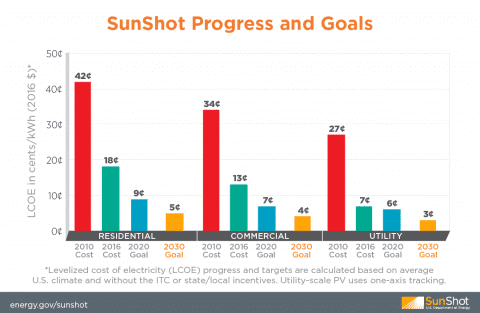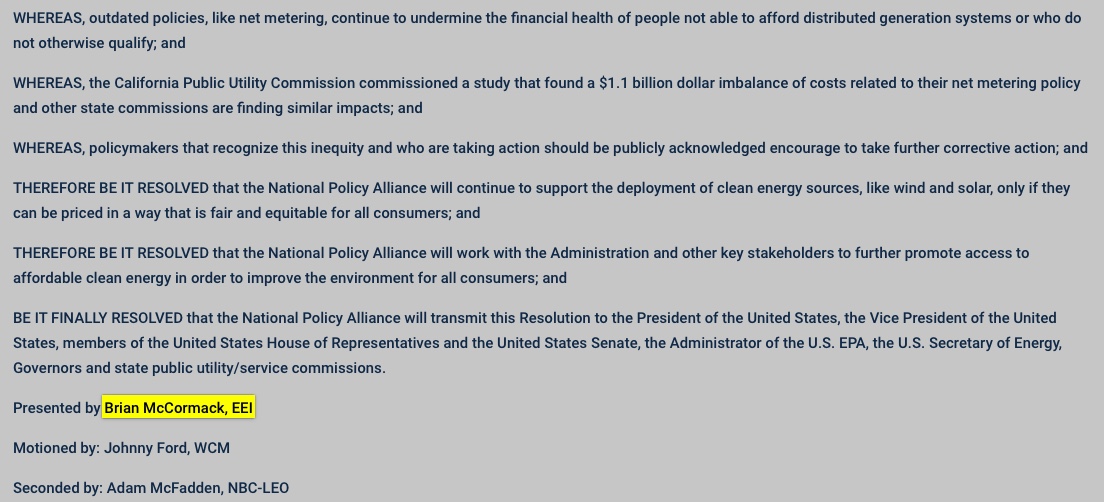New DOE Chief of Staff, Brian McCormack, Played Critical Role in EEI’s Rooftop Solar Campaign
Brian McCormack, most recently of the Edison Electric Institute (EEI), will become Energy Secretary Rick Perry’s chief of staff, reports confirmed yesterday. Previously, McCormack was EEI’s vice president of political and external affairs and one of the highest paid staffers at the trade association with a reported income of $440K in 2015.
At EEI, McCormack has worked with governors, state lawmakers, mayors and others to push the industry group’s priorities, including to change net metering policies and push for fixed charge increases on electric bills, part of a larger effort by EEI to attack distributed renewable energy like rooftop solar power.
Now as the chief of staff at the Energy Department, McCormack will likely have a hand in deciding the future of DOE’s Solar Powering America initiative, a number of grant, loan, and financing programs designed to advance new investment in renewable energy technologies, and the agency’s SunShot Initiative. This initiative, launched under President Obama, is designed to make solar energy affordable for all Americans with a goal of having the technology become cost-competitive with other forms of electricity by 2020 without subsidies.

EEI’s Contributions To Political Organizations Increase; Groups Start To Adopt Industry-Friendly Policy Resolutions
Starting in 2011, when McCormack joined EEI, EEI’s funding of political organizations known as 527s and 501(C)(3)s significantly increased. As Vice President of External Affairs, McCormack likely had a role to play in EEI’s jump in funding third-party organizations.
The organizations that were on the receiving end of EEI’s increase in spending have relationships with lawmakers at all levels of government – and many either had never received money from the trade association or saw funding increase.
Some of these groups and political organizations include the American Legislative Exchange Council, Americans For Prosperity, Americans for Tax Reform, Council of State Governments, the Democratic Legislative Campaign Committee, National Black Caucus of State Legislators, National Black Chamber of Commerce, National Policy Alliance, Republican Attorneys General Association, Republican State Leadership Committee, Rule of Law Defense Fund, State Policy Network, and the U.S. Chamber of Commerce.
Some of the organizations that started to receive EEI money in 2011 were either just created or had budgets where a few thousand dollars made up a noteworthy part of revenue. Organizations like the National Organization of Black Elected Legislative Women, which reported $318K in “program service revenue” in 2011, received $15,000 from EEI. Hispanics in Energy, which was created in 2012, had $79,850 in revenue in 2013 and received $10,000 from EEI that year. The World Conference of Mayors reported revenue of $81,261 and similarly received $10,000 from EEI in 2013.
Several of those organizations passed policy resolutions that endorsed EEI’s position towards rooftop solar and net metering. On at least two separate occasions, EEI’s McCormack was involved with the drafting and presenting of the policy resolutions to the organizations themselves.
McCormack presented a policy resolution titled “Supporting Equitable Access to Clean Energy” to the National Policy Alliance (NPA) that criticized net metering and echoed utilities’ “cost-shift” talking points. NPA is not a 501c3 and therefore does not have an annual IRS form to file. However, according to EEI’s documents, NPA did receive $7,500 in 2011 and another $10,000 in 2012.
The resolution was motioned by Johnny Ford of the World Conference of Mayors (WCM), and seconded by Adam McFadden of the National Black Caucus of Local Elected Officials (NBC-LEO). In addition to the $10,000 from EEI in 2013, WCM also received $5,000 in 2012 and $6,000 in 2014.
The National Policy Alliance (NPA) includes the leadership of the following organizations: Blacks in Government, National Association of Black County Officials, The National Bar, National Black Caucus of Local Elected Officials, National Black Caucus of School Board Members, National Black Caucus of State Legislators, National Conference of Black Mayors and the World Conference of Mayors. McCormack also submitted a resolution to NPA entitled, “Support of the Power Industry,” which focused on the EPA’s coal combustion rule and urged the agency not to designate coal ash as a hazardous waste.
Another organization with which McCormack worked as part of EEI’s rooftop solar campaign was the American Legislative Exchange Council (ALEC). In November 2013, ALEC released a new model bill that targeted net metering. It was passed and later adopted by ALEC’s Board of Directors in January 2014. Energy and Policy Institute confirmed in November 2013 that EEI’s Brian McCormack worked with ALEC on the resolution.
After not contributing money to ALEC in 2009, 2010, and 2011, EEI contributed $20,000 in 2012, doubled the funding in 2013, and increased it even more in 2014 to $58,000.
Role With Solar “Consumer Guide” Report
More recently, McCormack along with his colleagues Ed Comer, Rebecca Harsh Knox, Katie Romans Key, and Rick Tempchin, worked closely with a Louisiana State University professor to produce and publicize a rooftop solar report. The 2015 report includes sections like “Be Cautious About Predicted Savings” that encourage customers to “ask your utility company how rates have changed in the past few years and compare to the power purchase agreement’s escalation rate.”
EEI’s General Counsel, Ed Comer, explicitly asked Reichel not to list he or McCormack in the report’s acknowledgments to cover their tracks. They were ultimately listed, but Reichel seemed keenly aware of the need to hide EEI’s influence. In one email, she wrote: “We need to be careful that it does not read as having a utility bias, or it could be criticized and dismissed as skewed – defeating your purpose in having LSU author and publish it.”
Some of McCormack’s edits include:
- Deleting statements about solar’s attractive environmental attributes compared to fossil fuels.
- Deleting references to rising prices of electricity sold by utilities.
- Deleting references to rooftop solar panels obviating the need for new power plants.
- Adding references to heighten skepticism of rooftop solar companies.
- Inserting examples of utility solar programs as an alternative to rooftop solar.
The report was part of a coordinated effort by EEI to tar and feather rooftop solar companies with a myth of wide-scale customer abuse.
Update: On September 1, 2017, the American Oversight project obtained resumes for political appointees at the Department of Energy. Below is McCormack’s resume.




